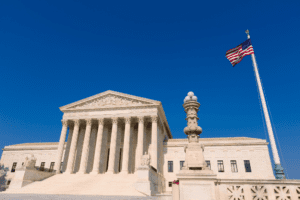 The dissent continued: The other two cases the Court cites for this point similarly offer it only limited support—either because the atextual intent element the Court advocates was irrelevant to the decision’s result, see O’Neill v. State, 16 Ala. 65 (1849), or because the decision adopted an outlier position not reflected in the other cases cited by the Court, see Simpson v. State, 13 Tenn. 356, 360 (1833); see also ante, at 42–43, 57 (majority opinion) (refusing to give “a pair of state-court decisions” “disproportionate weight”). The founding-era regulations— like the colonial and English laws on which they were modeled—thus demonstrate a longstanding tradition of broad restrictions on public carriage of firearms.
The dissent continued: The other two cases the Court cites for this point similarly offer it only limited support—either because the atextual intent element the Court advocates was irrelevant to the decision’s result, see O’Neill v. State, 16 Ala. 65 (1849), or because the decision adopted an outlier position not reflected in the other cases cited by the Court, see Simpson v. State, 13 Tenn. 356, 360 (1833); see also ante, at 42–43, 57 (majority opinion) (refusing to give “a pair of state-court decisions” “disproportionate weight”). The founding-era regulations— like the colonial and English laws on which they were modeled—thus demonstrate a longstanding tradition of broad restrictions on public carriage of firearms.
Beginning in the 19th century, States began to innovate on the Statute of Northampton in at least two ways. First, many States and Territories passed bans on concealed carriage or on any carriage, concealed or otherwise, of certain concealable weapons. For example, Georgia made it unlawful to carry, “unless in an open manner and fully exposed to view, any pistol, (except horseman’s pistols,) dirk, sword in a cane, spear, bowie-knife, or any other kind of knives, manufactured and sold for the purpose of offence and defence.” Ga. Code §4413 (1861). Other States and Territories enacted similar prohibitions. See, e.g., Ala. Code §3274 (1852) (banning, with limited exceptions, concealed carriage of “a pistol, or any other description of fire arms”); see also ante, at 44, n. 16 (majority opinion) (collecting sources). And the Territory of New Mexico appears to have banned all carriage whatsoever of “any class of pistols whatever,” as well as “bowie kni[ves,] . . . Arkansas toothpick[s], Spanish dagger[s], slung-shot[s], or any other deadly weapon.” 1860 Terr. of N. M. Laws §§1–2, p. 94.
The dissent expresses concern about how relying heavily on history allows judges to arbitrarily pick among competing historical accounts. This concern ignores the fact that there are usually so many cases addressing a given issue, that judges always have competing authority from which they can arbitrarily cite as precedent.
